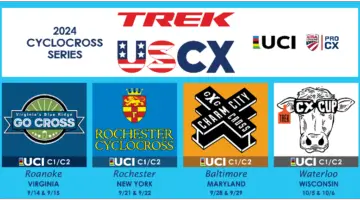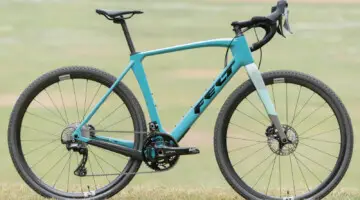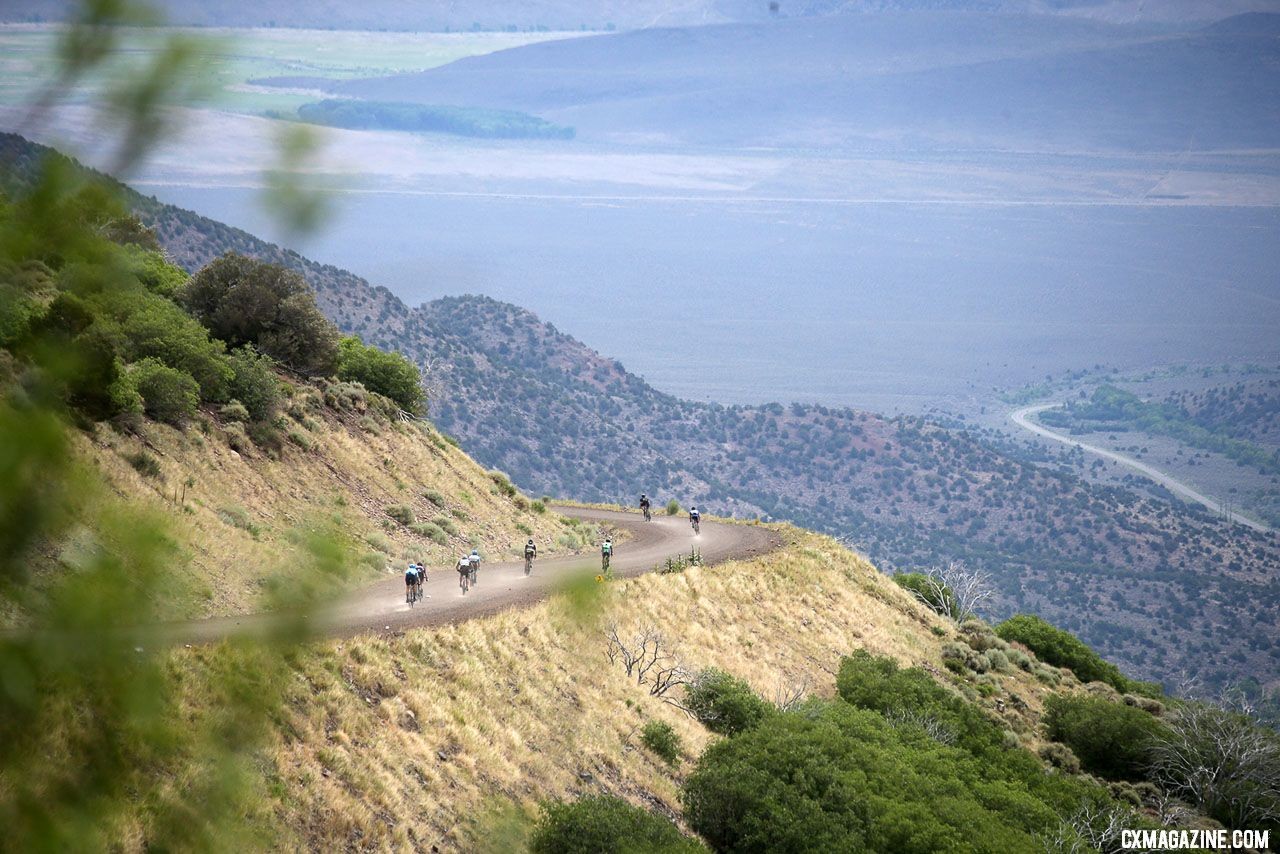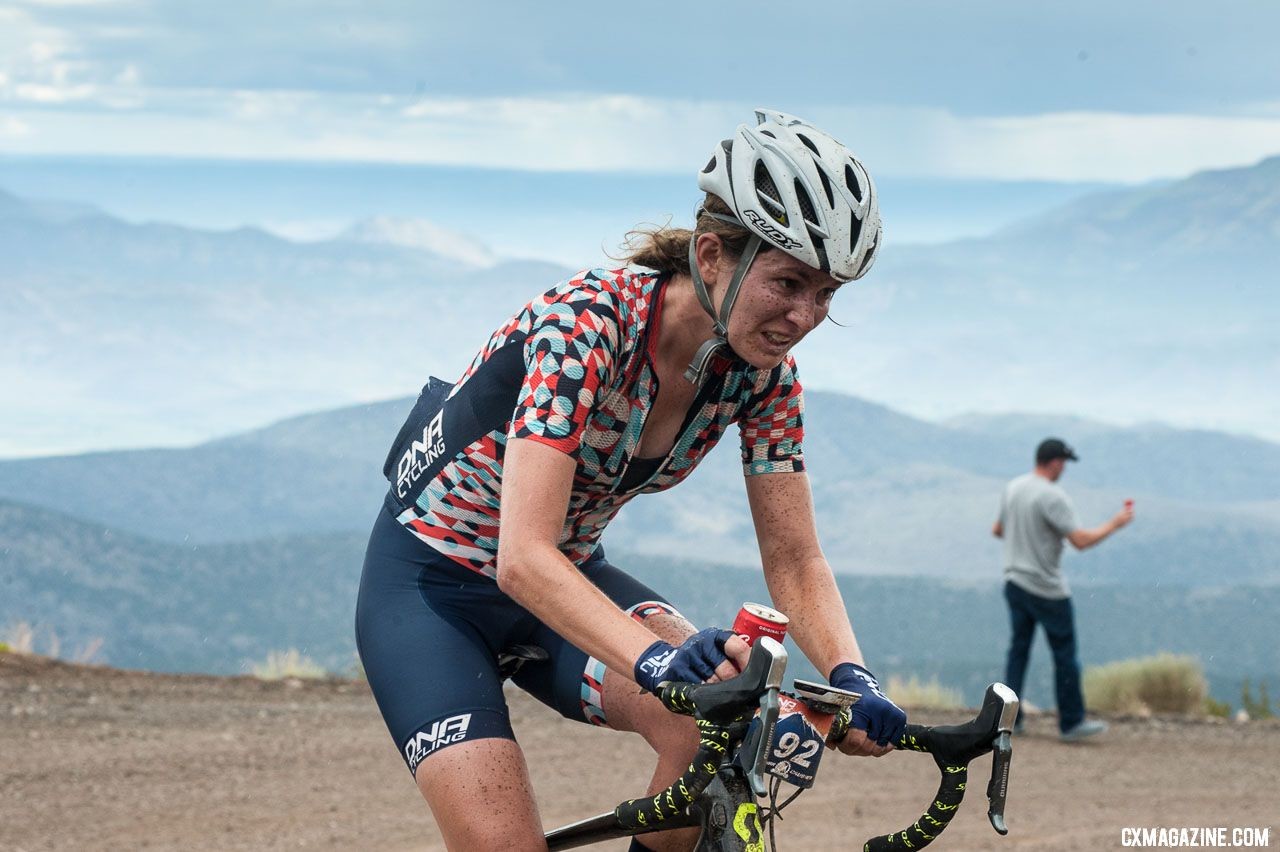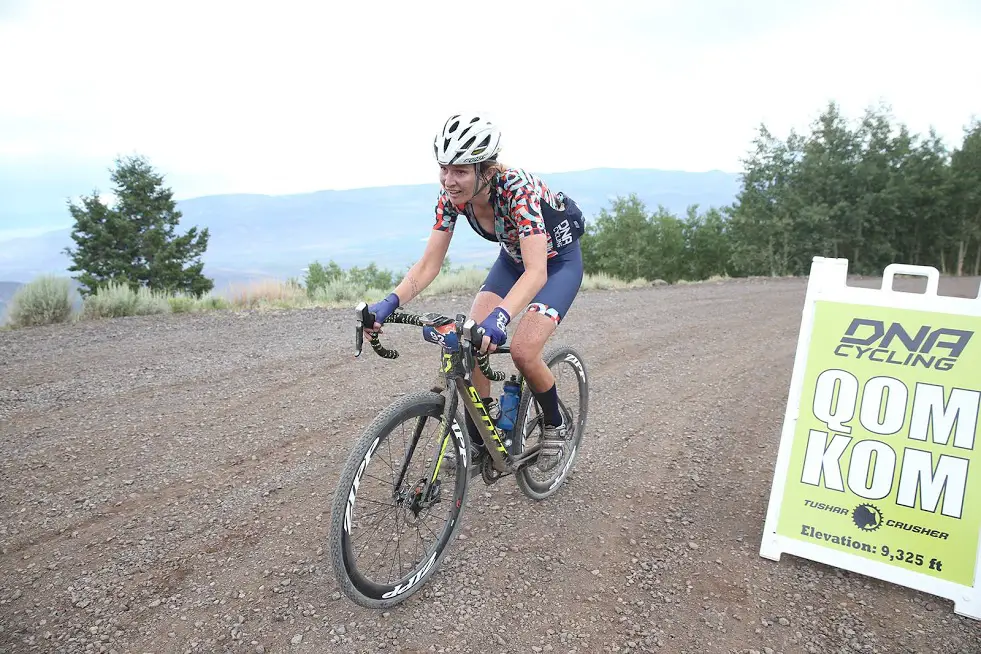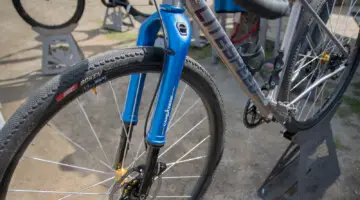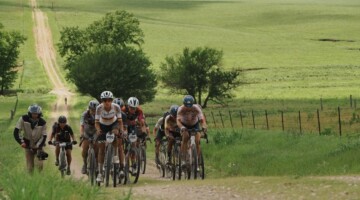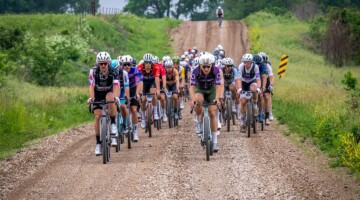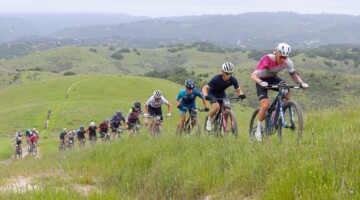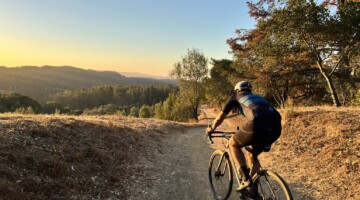“Compared to the emotional pain of almost losing everything, physical pain doesn’t have the same effect.”
When Lauren de Crescenzo came across the finish line first to win Utah’s Crusher in the Tushar gravel race in July, she told an interviewer, “I no longer have pain receptors.”
No, the 27-year-old Boulder resident does not have superpowers, she just has a different perspective on the physical pain caused by climbs such as the brutal Col ‘d Crush than most other cyclists do.
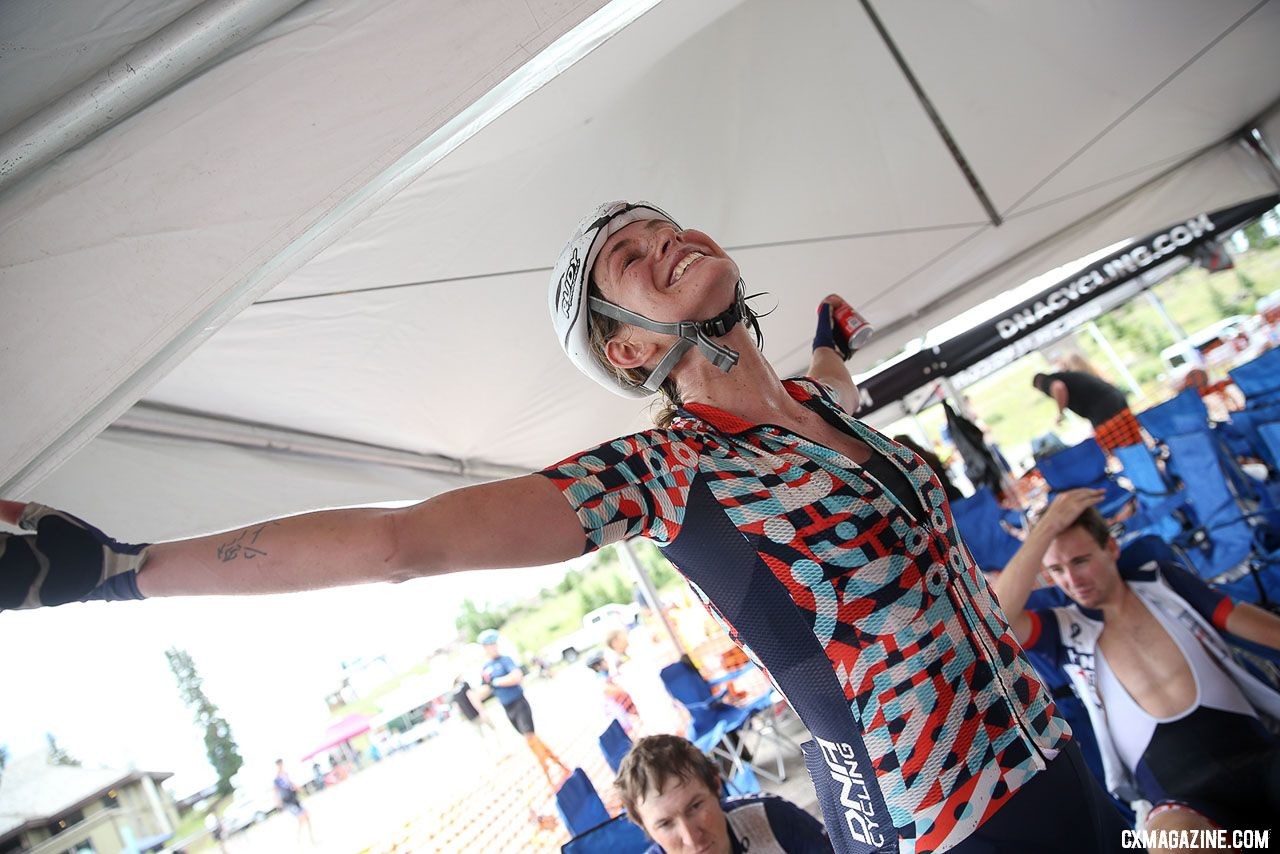
Winning the 2018 Crusher in the Tushar capped a 2+ year journey for Lauren De Crescenzo. © Cathy Fegan-Kim
In 2016, De Crescenzo was a professional cyclist starting her third year with the DNA Cycling team.
On April 2, 2016, at the San Dimas Road Race in California, De Crescenzo was doing her job as part of the lead-out train for a teammate. When she pulled off just before the finish, her handlebar got caught in the barrier, and she went o.t.b. into the fencing.
It was immediately evident it was a bad crash. Her teammate Beth Ann Orton, who is a physician’s assistant in real life, abandoned the race to help stabilize her spine and open her airway. De Crescenzo was airlifted to the hospital, and she spent the next six days in an induced coma.
Doctors gave De Crescenzo a 50-50 chance of surviving the crash, and she missed being paralyzed from the legs down by a millimeter.
In a split second, she had seemingly lost everything she loved, and as she recovered in a Denver rehab center, De Crescenzo wondered if she would ever ride her bike again.
Lauren De Crescenzo does not have superpowers, although one could make the case that with her remarkable recovery from a horrible crash, she does. De Crescenzo did not just survive the crash, just two years later she is back riding and even racing her bike again.
De Crescenzo is getting back to pre-crash Lauren, but when she started the Crusher in the Tushar, she brought a new perspective to the line.
“I have this totally different concept of pain now,” she said. “It doesn’t mean anything, physically. I went through so much other stuff it doesn’t mean anything to me anymore.”
“It was like I crushed my soul for two years and Crusher was only five hours, and I knew it was going to end. So it was fine.”
Given a second chance at life, Lauren De Crescenzo now has a second life in bike racing on gravel roads.
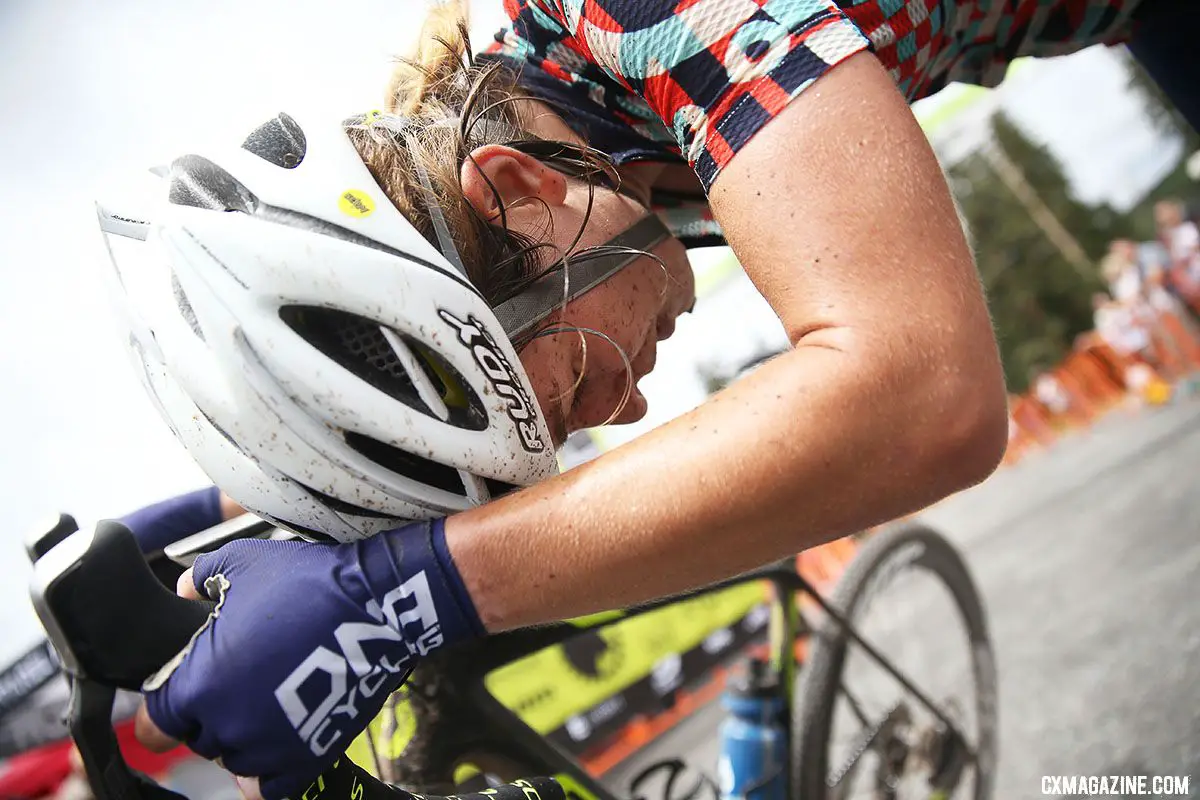
The concept of pain has taken on a new meaning for Lauren De Crescenzo. 2018 Crusher in the Tushar. © Cathy Fegan-Kim
The Pro
Lauren De Crescenzo grew up in Broomfield, Colorado, which is located about halfway between Boulder and Denver. De Crescenzo came to love cycling at a young age, so much so she started a cycling club while a student at Broomfield High School.
After graduating high school, De Crescenzo headed to Emory University in Atlanta to study anthropology. Her road bike came with her.
Her education in Atlanta included her school work, but it also included a crash course in how to get fast on the bike. “I really started riding in college,” she said about her start in the sport. “I really really started by doing the group rides in Atlanta. I would get dropped every day. I just accepted it as a challenge. I said, ‘This won’t happen again.’”
As De Crescenzo tells her story, it is clear that having a challenge to pursue pushes her to her best. De Crescenzo accepted the challenge of trying to hang with the fast group, and in time, she was not getting dropped anymore.
“Lauren is a goal-oriented person,” DNA Cycling team manager Cathy Fegan-Kim said. “Once she focuses on her goals, Lauren is all in.”
Group rides eventually led to racing, and not even a broken collarbone in one of her first-ever races could keep her away from the thrill of racing and everything that comes with it. After all, returning from an injury was just another challenge to take on.
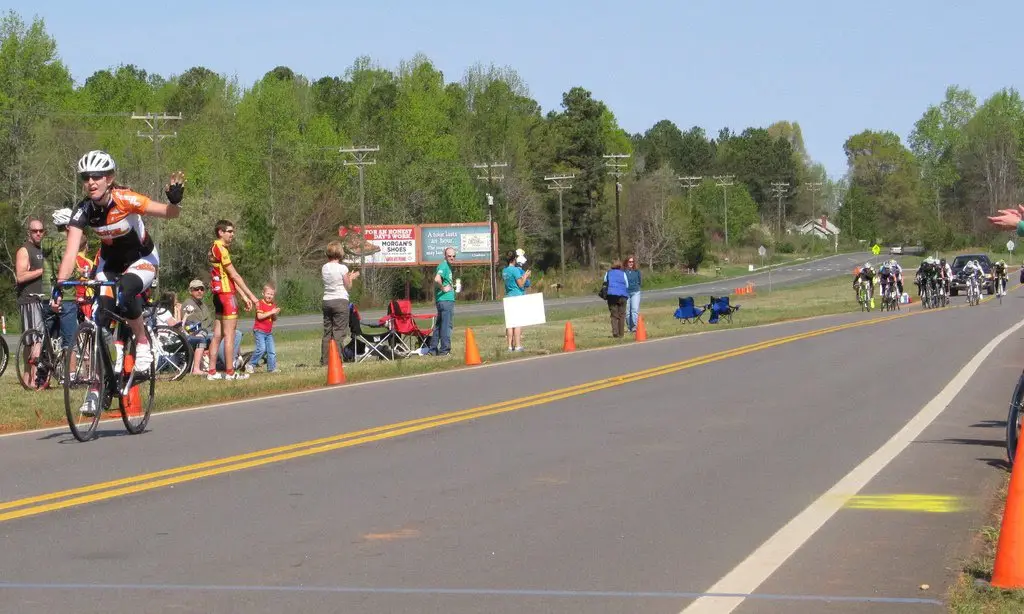
Lauren De Crescenzo at her second-ever bike race after breaking her collarbone in the first. She dubs the solo breakaway “The Crescenzo.” photo: courtesy
De Crescenzo’s road to becoming a pro bike racer started when she was invited to a USA Cycling Talent ID Camp in Colorado Springs along with her best friend Heather Fischer. “Wow I’m the best bike racer ever, I’m going to do the Olympics,” she said, looking back on her youthful exuberance when she got invited.
Very few cyclists reach the top of the sport that quickly; the excitement was short-lived. “They told both of us [Fischer] that we had no potential,” De Crescenzo said. “I also took that as a challenge. That’s around when I thought, Oh I should be a pro and prove these people wrong.”
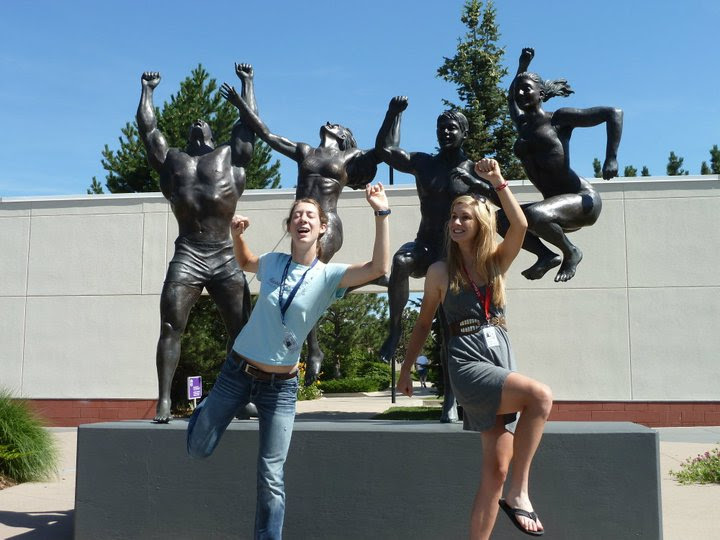
Lauren De Crescenzo (left) with her BFF Heather Fisher (right) at the Olympic Training Center. photo: M. De Crescenzo
Two years later, De Crescenzo and Fischer accomplished their shared goal of proving the doubters wrong. De Crescenzo took third at the Nationals D2 Road Race in 2012 and Fischer won the D1 race. The coaches told them their FTPs were not high enough, but the two best friends forever were now racing for Team USA in Europe.
“Everyone else had quit bike racing except for us,” De Crescenzo said. “We took it as a challenge.”
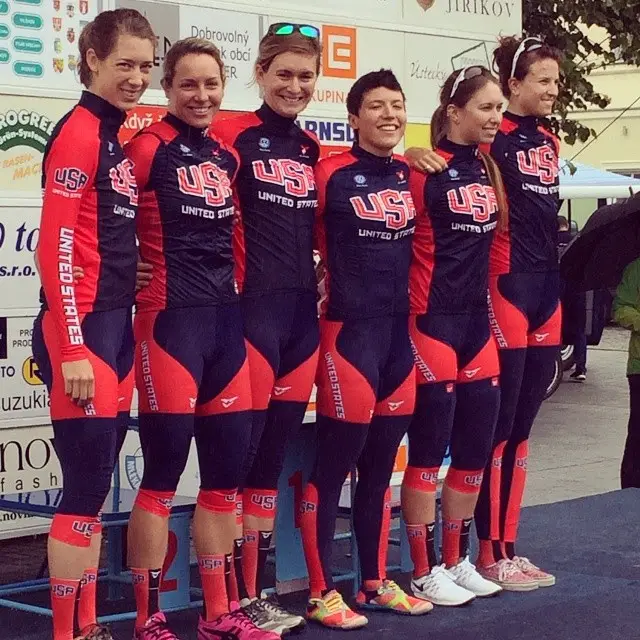
De Crescenzo (third from left) raced in Europe with Team USA. This photo is from the 2014 Krasna Lipa, where De Crescenzo finished 4th. “I thought I was a god,” she said. photo: Jack Seehafer
“Things really took off from there,” she continued. “I was able to tell teams that I raced in Belgium, and they thought that was cool for a 20-year-old.” With races such as the Omloop Het Nieuwsblad on her race resume, De Crescenzo signed with the Kenda p/b Geargrinders team for the 2012 season.
In 2013 she moved to the DNA Cycling team run by Alex Kim and Cathy Fegan-Kim. When De Crescenzo won the Crusher, she was wearing the colors of DNA. “They’re my forever team,” she said about the Utah-based program.
“Lauren is a goal-oriented person. Once she focuses on her goals, Lauren is all in.”
The Crash
Back when she was racing professionally, Lauren De Crescenzo described herself as a power climber and a solo breakaway specialist. When she was unable to get in a break, De Crescenzo was always the consummate teammate when called on to help lead out a sprint.
In early Spring, 2016, De Crescenzo was already off to a strong start in her third year with DNA Cycling. She had won the Rouge Roubaix mixed-terrain race in Louisiana and finished seventh in the GC at the Valley of the Sun Stage Race.
At the beginning of April, the DNA Cycling team was in Southern California for the San Dimas Stage Race. After the Stage 1 time trial, Stage 2 was a 50-mile road race.
The race came down to a sprint, with De Crescenzo joining in DNA Cycling’s lead-out train for Mia Manganello. About 200 meters from the finish, something went wrong.
With the madness of the finish, no one really knows what happened. According to team manager Fegan-Kim, what they think happened is that De Crescenzo pulled off the left at about 200 meters to go, clipped her handlebar on the barrier and went face first into the fencing.
It was immediately clear the crash was bad. “By no means was this a normal crash,” De Crescenzo said. “My teammate Beth Ann Orton, a Physician’s Assistant in real life, immediately stopped racing to come and clear my airways and stabilize my spine. I was then put on a helicopter and spent six days in an induced coma at a hospital in LA to stop the bleeding and swelling in my brain caused by my severe traumatic brain injury.”
De Crescenzo’s story of the crash comes from what her teammates and friends told her after the fact. The TBI she suffered caused extensive memory loss.
“I don’t remember anything,” she said about the crash. “I just remember waking up at Craig Hospital and saying, ‘Why is everyone in my hotel room right now?’ I had a lot of memory loss. I was in a coma for six days and then had post-traumatic amnesia for like three weeks. Then I guess one day my brain came back together.”
Fortunately for her, she was not alone in her recovery. Her parents, grandparents and best friend Fischer all flew to Los Angeles to wait for her to get out of the coma.
She also had the support of her other family. Cycling is a business and teams change every year, but DNA Cycling is a little different.
“She is family,” Fegan-Kim said about De Crescenzo. “It was mainly thoughts of what can we do for her as we would do for any family member.”
Alex Kim of DNA Cycling flew all the way back from Europe to join De Crescenzo’s family. After six days in a coma with her family and friends hoping she would pull through, De Crescenzo regained consciousness.
“When her feeding tube was taken out Alex face-timed me so that I could see Lauren,” Fegan-Kim said. “I didn’t know if she would remember me but as soon as Lauren looked at me she forced out, ‘Ca-thy’ and then mouthed, ‘I love you.’ I will never forget that. Lauren was in there.”
In the near term following the crash, De Crescenzo was lucky. Doctors gave her a 50-50 shot at surviving her head trauma. If her spine fracture was a millimeter lower, she likely would have been paralyzed from the waist down.
However, from the long perspective, De Crescenzo still faced a trying road to recovery that would test every ounce of her emotional toughness. The first stop was the Craig Rehabilitation Hospital in Denver.
“I didn’t know if she would remember me but as soon as Lauren looked at me she forced out, ‘Ca-thy’ and then mouthed, ‘I love you.’ I will never forget that. Lauren was in there.”
The Low Point
If you asked Lauren De Crescenzo what she is passionate about, she would likely say bike racing and learning. If you asked her what matters to her, she would say her cycling friends and her family.
The TBI she suffered in 2016 seemingly took all of that away from her.
De Crescenzo gave up graduate school to pursue a career in professional racing and the brain damage made it unclear if she would be able to return to school for an advanced degree.
As she sat in the rehab center, she was not sure she would ever ride, much less race again, and she feared her friends would move on without her.
“I thought my whole life was over. I have nothing left to do,” De Crescenzo said about her time at Craig. “ I can’t ride, I’m out of work. I’m going to lose all my friends. I was so so sad and living in a hospital. It was like, Fuck all of this.”
“There were paintings on Lauren’s floor and if there were bikes in the art, Grandpa had covered them with a towel,” Fegan-Kim said. “She did not want to talk about bikes or racing although she remained slightly curious about results at the races she was missing.”
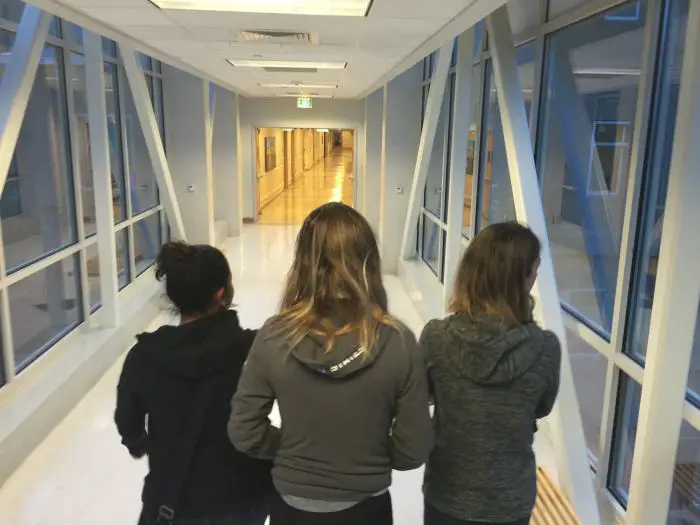
De Crescenzo’s time spent at the Craig Rehabilitation Hospital was a difficult time. Here, Cathy Fegan-Kim and Heather Fischer provide support. photo: courtesy
At her lowest point, De Crescenzo was not sure if she would survive her five weeks at Craig. “They were really worried about me for a minute,” she reflected. “I was really worried about me too. I definitely did try to do the suicide thing one time. That was bad.”
She survived her time at Craig, but her time there influenced her thinking about ever riding her bike again. “This is when I thought I would never touch a bicycle again,” De Crescenzo said. “I didn’t want to take any unnecessary risks and end up back at Craig Hospital. It’s a great rehab center, but I really hated being there.”
The Ice Cream Ride
Even though her escape from Craig was thwarted, De Crescenzo eventually recovered enough to head home to Boulder.
Riding bikes had been a part of De Crescenzo’s entire adult life. Yet, when she returned home, she decided to quit bike racing. What if she crashed again and had to go through rehab again? “I thought I was doing myself a favor,” she said about her thoughts at the time.
Even though she was out of the rehab hospital, De Crescenzo still faced a tough road to recovery. She was not in school, she unofficially quit bike racing. For a young woman who has achieved at the highest level academically and athletically, it was horrible.
“I was really really sad not doing anything,” she said. “I couldn’t work yet, I couldn’t drive, I was so sad.”
Lauren De Crescenzo has gone for literally thousands of bike rides in her life. Training rides, races, recovery rides, leisure rides; she has put in an uncountable number of miles on two wheels.
However, one of those rides stands out over all the others.
About a month after leaving Craig Hospital, De Crescenzo got a call from former Olympian and road national champion Timmy Duggan.
“Let’s go ride.”
The call was a special one because Duggan is one of the few cyclists who could relate to what De Crescenzo was experiencing. In 2008, Duggan crashed on a descent at the Tour of Georgia and suffered a traumatic brain injury. Like De Crescenzo, he probably should have died. Instead, he bounced back and made the Olympic team just four years later.
Part of why she said yes to go ride? “Yeah, he made a comeback and won Nationals and went to the Olympics. I was like, okay, he probably knows what he’s doing.”
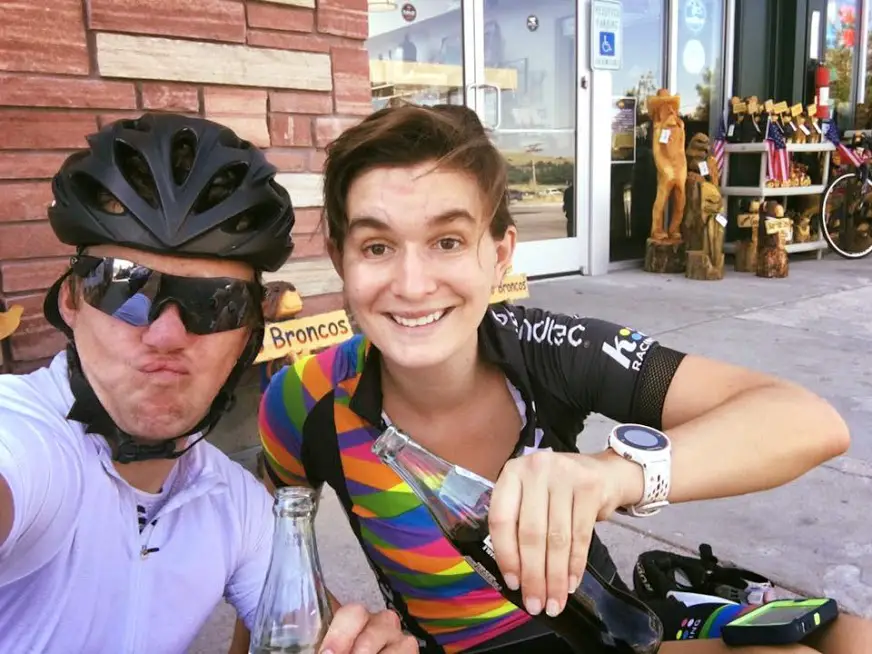
An ice cream and Coke ride with Timmy Duggan helped get De Crescenzo back on the bike after her crash. photo: courtesy
The two rode around Boulder, and Duggan empathized as few others could.
“I definitely remember that ride very well,” De Crescenzo reflected. “We talked about brain stuff for a really long time. I didn’t feel like anyone else would really understand. At that point, I felt like you kind of had to experience it first-hand to really understand and get into it about the injury. So we got into some stuff. It was good.”
The two finished the ride with ice cream. The flavor? Well, remembering would just make for too good of a story.
De Crescenzo’s retirement from riding bikes was over. “I really quit riding for like three weeks, four weeks max. I’m really bad at quitting bike racing. I’m good at quitting other things, but not bike racing.”
“I’m really bad at quitting bike racing.“
The Return
With fall fast approaching, students across the country are back to school. Some dread the return to learning, some are okay with it and the select few love going back to the classroom.
In 2017, even among the select group of students who love school, there is probably not a student in America who was more excited to be back in school than Lauren De Crescenzo.
Although she was out of the rehab center, the first year after the crash was a difficult one for De Crescenzo. She was living with her parents in Boulder but felt like she was without purpose as she recovered from the effects of the TBI.
“It was challenging for all of us that Lauren was not the Lauren pre-crash,” Fegan-Kim said. “Her first year of recovery she battled with depression and darkness. Her thought process was a circle and she repeated herself and most of the time it was about how bike racing ruined her life.”
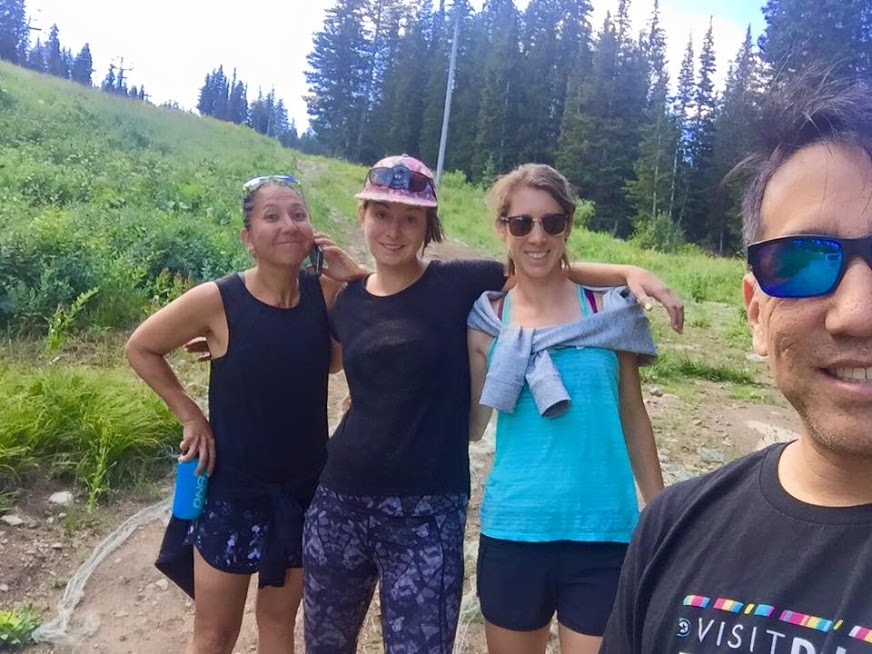
De Crescenzo spent time with Cathy Fegan-Kim, Heather Fisher and Alex Kim after the crash trying to to love new sports. photo: Alex Kim
De Crescenzo’s favorite thing in the world besides bike racing is learning. After graduating from Emory, De Crescenzo put her post-grad ambitions on hold to be a professional bike racer.
In the fall of 2017, she finally got the chance to return to her education by enrolling in the Epidemiology Master of Public Health program (think Kate Winslett in Contagion or Rene Russo in Outbreak) at the University of Colorado-Denver.
“I think a huge part of the rehab for me wasn’t actually going to rehab or therapy, it was definitely more going to grad school,” she said. “It kind of gave me a purpose again. Having a purpose and something to learn every day and pushing myself that way. It was a way to re-identify after being a cyclist for all those years.”
That did not mean that De Crescenzo did not ride her bike anymore. Feeling better and with a flexible student schedule, she slowly started to ride more.
After her crash, De Crescenzo’s circle of family and friends was sure she would never race her bike again. “The general agreement with her and everyone around her was that she would never race again,” Fegan-Kim said. “We discussed that she might ride a bike for fitness, but we all believed that could be years in the future.”
However, as we have learned thus far in this story, Lauren De Crescenzo loves riding her bike, and Lauren De Crescenzo loves a tough challenge.
“We knew that once she decided to start riding again that there was nothing we could do to stop it,” Fegan-Kim said.
Even though she does not identify as a “professional cyclist” anymore, De Crescenzo still rides her bike nearly every day. Instead of hitting power numbers and sticking to training plans, she now rides for fun and mental clarity.
“We knew that once she decided to start riding again that there was nothing we could do to stop it.”
The racing? That was thanks to her best friend forever (her words) Heather Fischer.
Early in 2018, De Crescenzo, Fischer and Colorado pro Amy Charity did a 120-mile ride from Boulder to Fort Collins and back. During that ride, De Crescenzo put the hurt on her riding partners.
After the race, Fischer had a new challenge for her. “She said, ‘You can’t let this fitness go to waste.’ I was like, that was the perfect thing to tell me. It was the only way I would be convinced to do Collegiate Nationals because I hadn’t done any races since my injury.”
That ride took place in April. De Crescenzo only had a few weeks to enter two Collegiate races to qualify for Nationals in Grand Junction. She did the Collegiate races at the Front Range Cycling Classic in Colorado Springs, winning both days, to qualify for Collegiate Nationals.
At Collegiate Nats, De Crescenzo finished third in the road race, fourth in the time trial and fifth in the criterium to take third in the GC. It was her same finish as 2012 when she thought she was going to go to the Olympics.
“It was funny because I got third in 2012 and I got third in 2018,” she said. “It’s like objective growth versus subjective growth.” She added, “Maybe it’s more symbolic that I got third two times, five years apart. Objectively, I’m the same person.”
If you look at the podium photo from Collegiate Nationals, De Crescenzo is hard to miss with a giant smile on her face. It was an expression of happiness that she was back racing and made it onto the podium at Nationals, right? Well, not quite.
“That smile, I feel like it was also a very obnoxious smile,” she said. “People were taking themselves so seriously, and relative to a lot of the other races, I’ve done Het Nieusblad and other European races that are way harder than Collegiate Nationals. Now, it’s just a bike race. Obviously, I still want to win all the time, but if I don’t, it’s okay. At least I didn’t crash.”
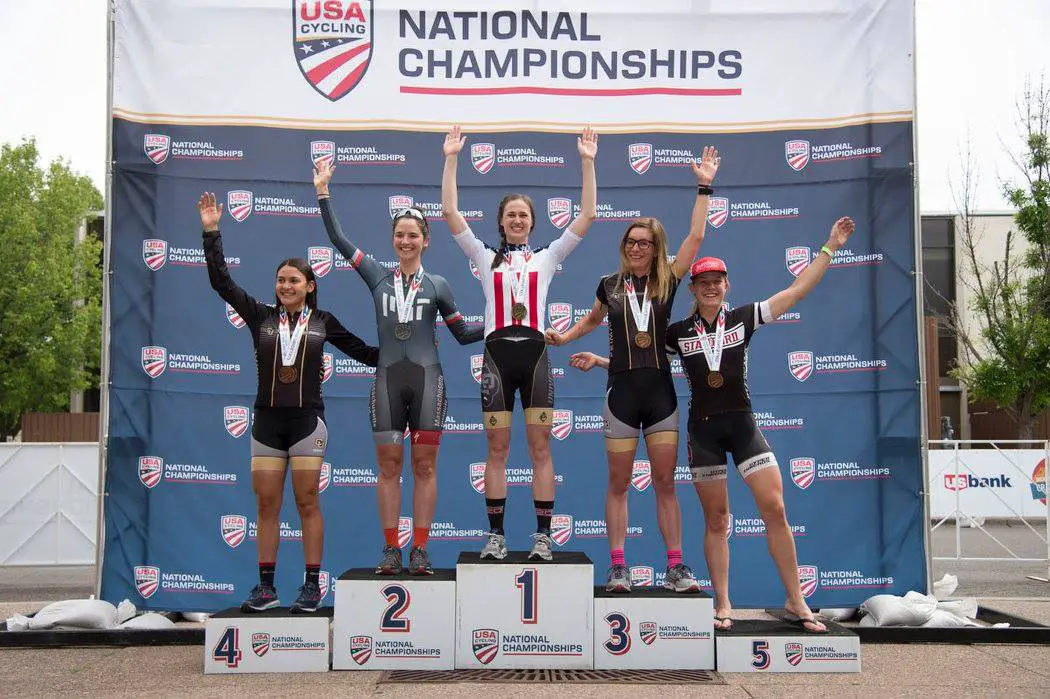
De Crescenzo finished third in the Omnium at Collegiate Road Nationals earlier this year. photo: Casey B. Gibson / USA Cycling
De Crescenzo will be the first to admit her bike racing friends have played an integral role in her recovery and return to bike racing. Whether it be Timmy Duggan getting her back on the bike, Cathy and Alex Kim supporting her through her injuries or Heather Fischer getting her back to race, De Crescenzo is lucky to have great people around her.
After Collegiate Nationals, Fischer had a simple message for her. “You’re welcome.”
Said De Crescenzo, “When I told her about Collegiate Nationals and all the feelings I had about loving racing and having a challenge and having the chance to hang out with all my racing friends, she said ‘You’re welcome.’ She really knows me and knew that was something I’d love to do and something I’ve been missing out on for a couple of years.”
She continued, “I think it’s been really really important having these people in my life telling me I could still do it. Then I realized I could still do it, so it would be really hard to discourage me now. It was really good to know, from a mental perspective, that I’m back physically. I never felt like I wasn’t normal physically, but it was more the mental state and psychological aspect of the crash.”
Early May is a tough time for graduate students, with finals and final projects taking up all of their time. For De Crescenzo, the chance to take finals with a clear head while also racing at Collegiate Nationals was a symbolic moment in her recovery.
“The doctors at the hospital said that it would take about two years to get back to normal cognitively, and that’s when I did Nationals and was taking finals,” she said. “I was like, oh, I think I might be a normal person again. It definitely took a full two years.”
The Comeback Kid
After winning the Crusher in the Tushar, De Crescenzo did an interview with Cyclocross Magazine where she talked about her crash, rehab and comeback to cycling. If anything is clear from the interview it is that De Crescenzo is the best person to tell her story.
Fortunately, while not busy working on her Master’s thesis, De Crescenzo has been writing a book about her experience. The working title is “The Comeback Kid.”
The seed for the book was planted after Collegiate Nationals when USA Cycling reached out to De Crescenzo for an interview. “They had my GoFundMe thing all over the USAC website, so they were interested because they never thought I would ever ride a bike again, probably, much less show up at Collegiate Nationals,” she said.
After talking with the person from USA Cycling, De Crescenzo had an epiphany of sorts. “I went on a run after that and decided I should write a book about this because I have so much stuff to say,” De Crescenzo said. “I was taking notes before I even talked to USAC to keep track of everything I wanted to say. I turned that Google Doc into a really long one, and that’s what I’m working on right now.”
De Crescenzo is now 55,000+ words into her book. She said the book shares her experiences since April 2, 2016—the crash, rehab, depression and the comeback—but it also tries to provide inspiration for other people who have experienced a major injury, depression or the loss of someone or something they love.
“I felt like if I could share what I experienced and if any one person looking for any type of guidance with anything, maybe it would have helped me two years ago,” she said about the book.
She quickly followed that up with some of her characteristic sense of humor. “Well, maybe two years ago I would have laughed at the idea of reading a book about it.”
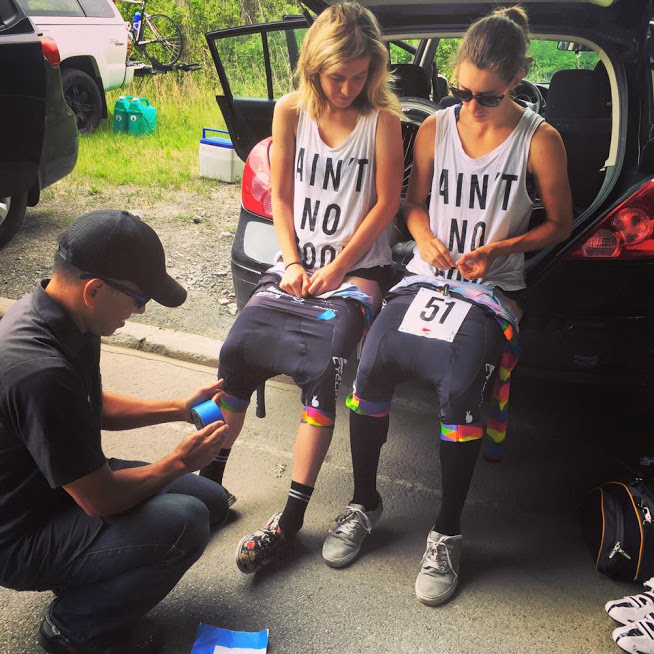
Although the crash has changed De Crescenzo, the fun person inside from her racing days remains. Here, with Heather Fischer in matching t-shirts. photo: Cathy Fegan-Kim
De Crescenzo said that one of the biggest things she has learned since the crash is a sense of perspective. Looking back at the time immediately following the crash, she now has a bit of a sense of humor about it, but at the time, she felt her entire world had crashed down around her.
Recovering from an injury as an athlete can be a depressing and isolating experience. With her experience of how long the road to recovery can be, De Crescenzo wants to let others know that if she can recover from a traumatic brain injury, they can recover from whatever challenge they are facing.
“It’s definitely a very for-real kind of book,” she said. “I know your life sucks and you might want to die right now, but it gets better. One of the core things in there is that whatever your injury or depression is, it could always be worse. In my case, I could have been dead. I’m coming to terms with that, because two years ago, I was like, this can’t be any worse. My life is over.”
The New Lauren
Despite everything she has gone through, Lauren De Crescenzo still loves riding her bike. When she heads out on her bike these days, there is no training plan, no coach, no tapering for target races, just her and the open road.
Typically, this is the point in the story where the author puts a quote from the athlete about how she sees riding a bike in a new way and has a deeper appreciation for cycling.
For De Crescenzo, that may be true, but it is not the whole story.
As has been the case her whole life, De Crescenzo loves a challenge, and what better challenge is there for an athlete than training hard and racing?
“I love riding my bike, and I kind of like the challenge of having an upcoming race,” she said. “The challenge of pushing yourself and have a reason why you’re on the bike all the time.”
Having a race to train for is probably a good thing for De Crescenzo because even without a race, she will likely be on her bike pushing herself as hard as she can.
“Lauren was excited to be back on the team and spent hours on the bike riding hard, which is the only pace she knows,” Fegan-Kim said.
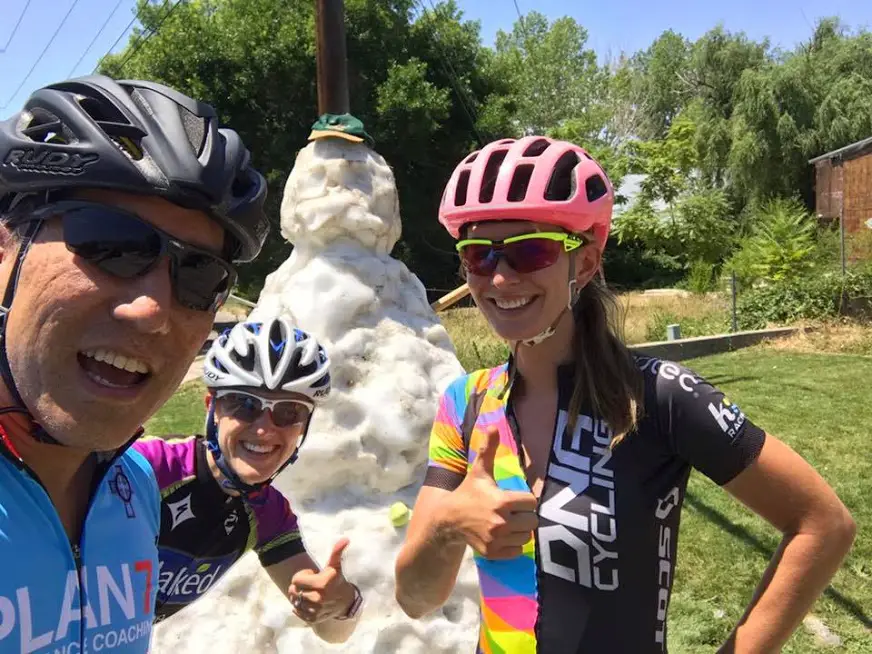
In 2017, De Crescenzo was back on the bike and starting to train and ride with friends again. photo: courtesy
That beauty of riding? For De Crescenzo, it also includes a lot of suffering.
“I’m just feeding into it all the time and trying to pretend I’m not a masochist,” she said. “I don’t have a coach anymore who tells me not to ride as much as I’m riding right now. I just coach myself and am probably just chronically overtrained because I’m a masochist.”
Without a coach, she is now free to ride by feel and train how she wants, which is a marked departure from the structure nearly all professional riders have via their coaches.
“I do whatever my body tells me that day,” she said. “If I’m feeling good, sure I’ll make myself miserable. If I feel like crap, I’ll just go ride around at my default power of 168 watts. Otherwise, I’ll go really hard if I feel spritely.”
The Crusher
Although she loves the challenge of training for an upcoming race, one of the biggest moments of her return to riding happened almost on a whim.
Alex Kim and Cathy Fegan-Kim of DNA Cycling live in Utah, which is the home of the famed Crusher in the Tushar gravel race. In the weeks before the race, De Crescenzo decided a trip to Utah to race some gravel and reunite with her DNA Cycling family would be perfect. The Kims pulled a string or two, and she was registered for the race.
“Lauren wanted in on the gravel scene, and that’s when she emailed us to see if we can get her into Crusher,” Fegan-Kim said. “We thought that if she has to compete, then doing gravel events such as Crusher would be safer for her than mass start road races.”
The Crusher in the Tushar is held in the Tushar Mountains in Southwest Utah. The 70-mile race has two big climbs and one long descent along its very climby route. The second of these is known as the Col ‘d Crush, which is a 3,000-foot climb up dirt a road. The entire race takes place at elevations higher than 6,000 feet above sea level and the climbs top off at over 10,000 feet.
Even with the Dirty Kanzas and Trans Iowas of the gravel world, the Crusher is one of the toughest gravel races in the U.S.
On paper, the Crusher is the perfect race for Lauren De Crescenzo. Although she was never a pure climber, she can turn the pedals on hills, and perhaps more importantly, she lives at elevation in Boulder and often heads up into the mountains of the Front Range.
“I’m always better at high-altitude races,” she said. “This year is when they started telling me I’m a high-altitude climber. I can kind of climb at sea level, but I’m way better at altitude.”
This year’s Crusher in the Tushar featured an impressive Women’s field that included 2017 Dirty Kanza winner Alison Tetrick and gravel legend Rebecca Rusch. Perhaps already flying a bit under the radar since she had not raced with DNA Cycling since 2016, De Crescenzo already had a secret weapon.
“We were driving down there the day before and all the girls in the car were complaining about how it was at high altitude and they were from sea level,” De Crescenzo remembered. “I just said nothing. I didn’t want to give away my secret that I’m totally okay up with it.”
On race day, De Crescenzo was a bit surprised when another woman stuck with her up the first of the two big climbs. However, when the hit the second climb, it was her time to, to be derivative, crush it.
“I just put my head down, grit my teeth and thought about how much it would mean to me—and my teammates, friends and family—if I could finish first given my injuries two and a half years earlier,” she said.
No one was going to catch De Crescenzo on the 3,000-foot climb at altitude. The grind up the Col ‘d Crush is a masochist’s dream and for someone who can push herself at altitude, it was perfect.
De Crescenzo crossed the finish line a the top of the mountain and collapsed at the finish, too tired to post up despite her excitement at winning.
“I literally fell off my bike and Cathy Fegan-Kim caught me,” she said. “But it was the best feeling literally ever.”
Fegan-Kim was there to share the moment with De Crescenzo. If ever it was a time for a picture to be worth a thousand words, this was it. “I don’t know if words can explain how excited I was when she won so I just sent a photo shot of us at the finish.”
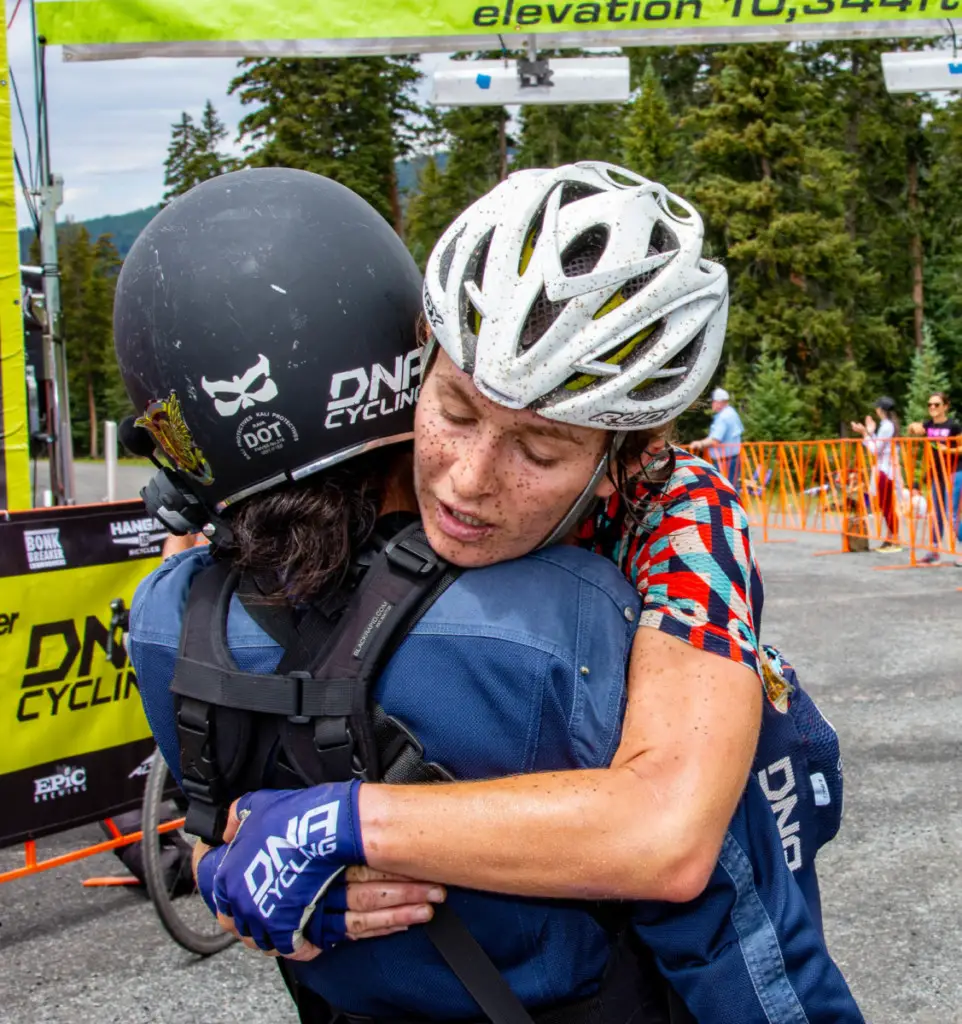
Catherine Fegan-Kim, co-owner of the DNA Cycling Women’s Team, hugs Women’s Open winner Lauren DeCrescenzo just after the finish line at Eagle Point Resort. 2018 Crusher in the Tusher. photo: Steven Sheffield
If De Crescenzo has avoided being philosophical about her comeback to the bike, she was willing to acknowledge the win at the Crusher had a deeper meaning for her.
“Winning this race wasn’t just about winning a bike race,” she reflected. “It was about proving to myself, friends and family that I’m finally recovered, at least physically. Every day, I feel like I’m getting closer and closer to pre-crash Lauren, but an updated version.”
“I would say that the emotional pain I experienced for the two years following my crash was significantly worse than the five hours of crushing myself at the Crusher. I actually like crushing myself. Now it’s just a matter of physical output.”
The Future
With fall coming, Lauren De Crescenzo’s focus now turns to school. Now in the second year of her Master’s program, she now has to balance writing a thesis with finishing her book.
As for riding, De Crescenzo said she feels like she has found a new home in the growing U.S. gravel scene. With the long rides and courses that often feature a lot of climbing, it is the perfect fit for her cycling skill set.
De Crescenzo’s second act as a bike racer may very well be that of a gravel star.
“Lauren is a goal-oriented racer with a heart full of gravel so we know our Comeback Kid will make the best of this second time around in the racing scene, only this time on gravel roads,” Fegan-Kim said.
Of course, after she won the Crusher in the Tushar on a borrowed Scott cyclocross bike, the first step of her new career will likely be getting a gravel bike.
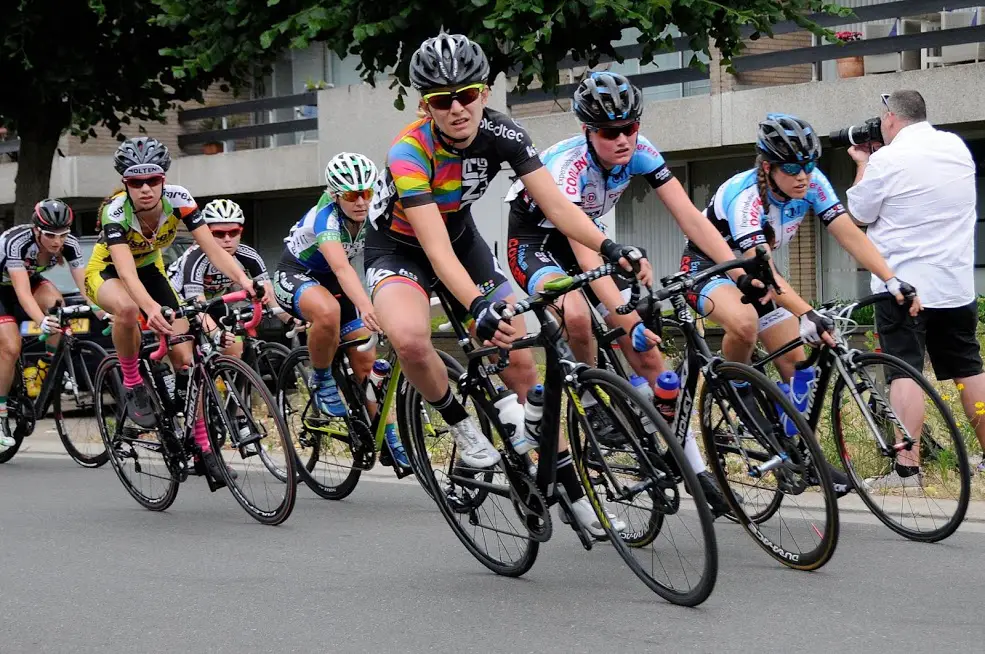
Although Lauren De Crescenzo will never race a kermesse in Europe again, she does have a second life on the bike as a gravel racer. photo: courtesy
If you would have told Lauren De Crescenzo at the beginning of 2016 that she would be winning gravel races two years later, she probably would have laughed. She was a professional road bike racer before a horrific crash while doing what she loves nearly took everything away from her.
As she learned during her recovery, it could always be worse and it gets better.
It did get better for De Crescenzo, and now the new Lauren is nearly the same as the old one. That can only mean that soon enough, she will find another challenge to face down and conquer.










